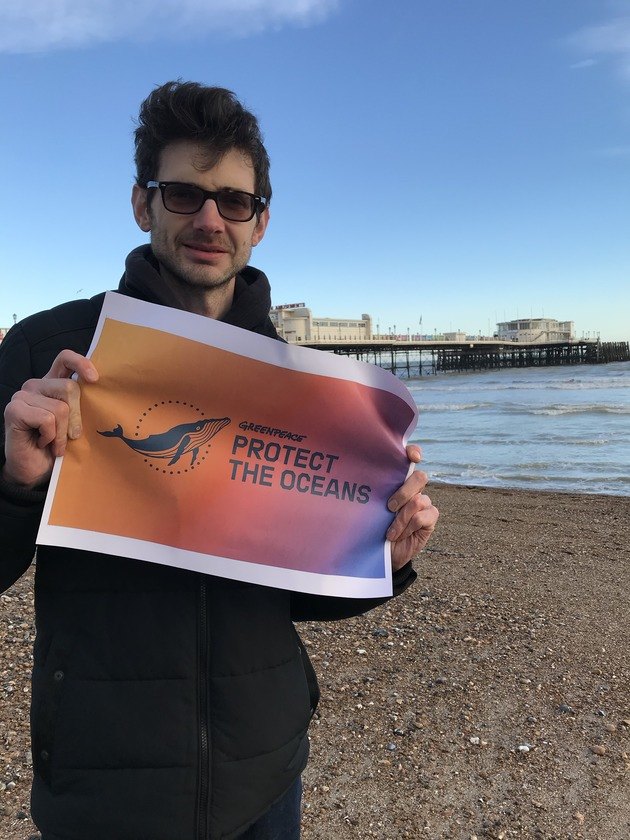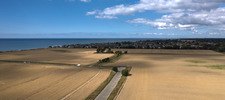February 26th, 2021
Tags: Environment Eco, Worthing
Why not be the first to send us your thoughts

Thank you for your comments, they will appear shortly once approved.
Greenpeace Arun & Adur Group demand bottom trawler ban, as Greenpeace builds new underwater boulder
Activists on the Greenpeace ship Esperanza are currently building a new underwater boulder barrier in the Offshore Brighton marine protected area in the English Channel, one of the UK’s most heavily bottom trawled protected areas.
This follows Greenpeace’s Dogger Bank boulder barrier and will close 55 square nautical miles of Offshore Brighton, one fifth of its total area, to destructive bottom trawling. Celebrities including Thandie Newton, Hugh Fearnley-Whittingstall, Paloma Faith, Bella Ramsey, Mark Rylance, Jarvis Cocker and Ranulph Fiennes have signed their names to boulders.
In response to Greenpeace’s Dogger Bank boulder barrier, the UK government announced new bylaws which would totally close the Dogger Bank and South Dorset protected areas, and partially close two other protected areas, to bottom trawling. This piecemeal approach would still leave 97% of UK offshore protected areas, 74 out of 76, fully or partially open to bottom trawling.
Laurence from the Arun and Adur Local Greenpeace Group, said:
‘‘I’m really shocked and disappointed to discover that although the Government has closed some protected areas to industrial fishing, this Marine Protected Area off the Sussex coast can still be legally exploited by destructive industrial fishing boats. That’s why I have been out on the beach by Worthing Pier calling for bottom trawlers to be banned from fishing in all of the UK’s Marine Protected Areas. Please support our call to end industrial fishing in MPAs, by signing our petition’
Bottom trawlers spent 3099 hours fishing in Offshore Brighton in 2019. Offshore Brighton was established in 2016 to protect its seabed habitat, which is being destroyed by bottom trawling. According to the government, Offshore Brighton is “unlikely to be moving towards conservation objectives”.
Greenpeace is calling on the government to ban bottom trawlers and supertrawlers from fishing in all of the UK’s marine protected areas. Last year, 84 MPs from across Parliament, and 29 Conservative MPs, signed a Greenpeace-coordinated open letter, calling on the Secretary of State George Eustice to ban destructive industrial fishing from UK marine protected areas [6]. Local MPs Sir Peter Bottomley and Tim Loughton have not signed the open letter.
The government taking steps to restrict bottom trawling in a handful of protected areas demonstrates some political will, following Brexit, to properly protect the UK’s offshore waters. This was previously difficult because introducing restrictions on fishing operations in offshore UK waters required agreement from other EU member states.
Chris Thorne, an oceans campaigner at Greenpeace UK, said from on board the Esperanza:
“Offshore Brighton is the perfect monument to our government’s failure to protect our seas. It exists specifically to protect the seabed, but bottom trawlers spend thousands of hours each year ploughing this sensitive habitat.
“The government’s move to properly protect just two of the UK’s protected areas barely touches the tip of the iceberg in terms of what is needed to save our oceans. All of the UK’s protected areas need real protection, not just a handful. This government is supposed to be showing global leadership on ocean conservation and fighting for 30% of the world’s oceans to be protected, but it can’t even properly protect 30% of our own waters.
“The move to stop bottom trawling in the Dogger Bank proves the UK government can stop destructive industrial fishing if it wants to. The government must show more ambition in a year when it is supposed to display global leadership on solving the climate and nature emergencies. It must urgently ban destructive industrial fishing from all of the UK’s protected areas at sea by restricting fishing vessel licenses.”
Hugh Fearnley-Whittingstall, who was at sea to bear witness to Greenpeace deploying the boulders, said:
“I’m proud to have had the chance to put my name on one of these boulders, and to be there today to bear witness to the creation of this boulder barrier. This action will play a small but significant role – and far more than our Government has so far done – to actually protect Offshore Brighton in a pragmatic and effective way. However, this shouldn’t be necessary. Our fervent hope is that our government will now turns words into action, papers parks into real conservation, and properly protects our oceans”
Most of the UK’s protected areas in offshore waters (those more than 12 nautical miles from the coast) were established to protect the seabed. Currently, there are no full bottom trawling bans in any of the UK’s offshore protected areas. Data released by Oceana last year revealed that 97% of the UK’s offshore marine protected areas are being bottom trawled.
Greenpeace informed the relevant marine authorities of the precise coordinates of each boulder to ensure navigational safety for other seafarers. Greenpeace also commissioned an independent scientific agency, BioLaGu, to conduct a Natura 2000 Environmental Impact Assessment to determine the impact of this activity. The assessment concluded the activity would not have a significant impact on the protected features of Offshore Brighton.
Greenpeace’s activity will prevent bottom trawling in part of the Offshore Brighton protected area. Vessels which fish here will still be able to operate elsewhere. It is scientifically proven that fully or highly protected marine areas lead to significant spillover benefits for the wider marine ecosystem, helping safeguard and boost fish stocks both within and outside the protected area. A network of fully or highly protected marine areas would help UK fishing communities by ensuring there are healthy oceans, full of fish, for generations to come.
Greenpeace is committed to achieving proper protection for all of the UK’s marine protected areas. A Greenpeace report, Bright Blue Seas, released in August 2020 revealed that the majority of the UK’s offshore marine protected areas are failing to meet conservation targets, and almost every offshore marine protected area has no site condition monitoring in place [9].
The UK government should implement this by immediately restricting vessel licenses to operate in protected areas, as opposed to following the slow local bylaw approach being employed for the Dogger Bank, which does not reflect the urgency of the climate and nature emergencies.
In response to Greenpeace’s Dogger Bank boulder barrier, the UK government announced new bylaws which would totally close the Dogger Bank and South Dorset protected areas, and partially close two other protected areas, to bottom trawling. This piecemeal approach would still leave 97% of UK offshore protected areas, 74 out of 76, fully or partially open to bottom trawling.
Laurence from the Arun and Adur Local Greenpeace Group, said:
‘‘I’m really shocked and disappointed to discover that although the Government has closed some protected areas to industrial fishing, this Marine Protected Area off the Sussex coast can still be legally exploited by destructive industrial fishing boats. That’s why I have been out on the beach by Worthing Pier calling for bottom trawlers to be banned from fishing in all of the UK’s Marine Protected Areas. Please support our call to end industrial fishing in MPAs, by signing our petition’
Bottom trawlers spent 3099 hours fishing in Offshore Brighton in 2019. Offshore Brighton was established in 2016 to protect its seabed habitat, which is being destroyed by bottom trawling. According to the government, Offshore Brighton is “unlikely to be moving towards conservation objectives”.
Greenpeace is calling on the government to ban bottom trawlers and supertrawlers from fishing in all of the UK’s marine protected areas. Last year, 84 MPs from across Parliament, and 29 Conservative MPs, signed a Greenpeace-coordinated open letter, calling on the Secretary of State George Eustice to ban destructive industrial fishing from UK marine protected areas [6]. Local MPs Sir Peter Bottomley and Tim Loughton have not signed the open letter.
The government taking steps to restrict bottom trawling in a handful of protected areas demonstrates some political will, following Brexit, to properly protect the UK’s offshore waters. This was previously difficult because introducing restrictions on fishing operations in offshore UK waters required agreement from other EU member states.
Chris Thorne, an oceans campaigner at Greenpeace UK, said from on board the Esperanza:
“Offshore Brighton is the perfect monument to our government’s failure to protect our seas. It exists specifically to protect the seabed, but bottom trawlers spend thousands of hours each year ploughing this sensitive habitat.
“The government’s move to properly protect just two of the UK’s protected areas barely touches the tip of the iceberg in terms of what is needed to save our oceans. All of the UK’s protected areas need real protection, not just a handful. This government is supposed to be showing global leadership on ocean conservation and fighting for 30% of the world’s oceans to be protected, but it can’t even properly protect 30% of our own waters.
“The move to stop bottom trawling in the Dogger Bank proves the UK government can stop destructive industrial fishing if it wants to. The government must show more ambition in a year when it is supposed to display global leadership on solving the climate and nature emergencies. It must urgently ban destructive industrial fishing from all of the UK’s protected areas at sea by restricting fishing vessel licenses.”
Hugh Fearnley-Whittingstall, who was at sea to bear witness to Greenpeace deploying the boulders, said:
“I’m proud to have had the chance to put my name on one of these boulders, and to be there today to bear witness to the creation of this boulder barrier. This action will play a small but significant role – and far more than our Government has so far done – to actually protect Offshore Brighton in a pragmatic and effective way. However, this shouldn’t be necessary. Our fervent hope is that our government will now turns words into action, papers parks into real conservation, and properly protects our oceans”
Most of the UK’s protected areas in offshore waters (those more than 12 nautical miles from the coast) were established to protect the seabed. Currently, there are no full bottom trawling bans in any of the UK’s offshore protected areas. Data released by Oceana last year revealed that 97% of the UK’s offshore marine protected areas are being bottom trawled.
Greenpeace informed the relevant marine authorities of the precise coordinates of each boulder to ensure navigational safety for other seafarers. Greenpeace also commissioned an independent scientific agency, BioLaGu, to conduct a Natura 2000 Environmental Impact Assessment to determine the impact of this activity. The assessment concluded the activity would not have a significant impact on the protected features of Offshore Brighton.
Greenpeace’s activity will prevent bottom trawling in part of the Offshore Brighton protected area. Vessels which fish here will still be able to operate elsewhere. It is scientifically proven that fully or highly protected marine areas lead to significant spillover benefits for the wider marine ecosystem, helping safeguard and boost fish stocks both within and outside the protected area. A network of fully or highly protected marine areas would help UK fishing communities by ensuring there are healthy oceans, full of fish, for generations to come.
Greenpeace is committed to achieving proper protection for all of the UK’s marine protected areas. A Greenpeace report, Bright Blue Seas, released in August 2020 revealed that the majority of the UK’s offshore marine protected areas are failing to meet conservation targets, and almost every offshore marine protected area has no site condition monitoring in place [9].
The UK government should implement this by immediately restricting vessel licenses to operate in protected areas, as opposed to following the slow local bylaw approach being employed for the Dogger Bank, which does not reflect the urgency of the climate and nature emergencies.
Tags: Environment Eco, Worthing
Comments (0)
No comments have been submitted yet.Why not be the first to send us your thoughts
Leave A Comment
Thank you for your comments, they will appear shortly once approved.
Topics
BroadwaterCrimeCissburyDurringtonGoringTarringWorthingWest WorthingHighdownStudent LifeCompetitionBusiness NewsLocal NewsCharity NewsEvents NewsOpinion
Recent Posts
 Hemiko - Worthing Heat Network Free Parking Spring/Summer 2025April 2nd, 2025
Hemiko - Worthing Heat Network Free Parking Spring/Summer 2025April 2nd, 2025 How a Dad-led Project Turned a Seaside Town into a Maths Music RevolutionApril 1st, 2025
How a Dad-led Project Turned a Seaside Town into a Maths Music RevolutionApril 1st, 2025 Worthing Borough Council wins latest battle to protect Chatsmore FarmMarch 31st, 2025
Worthing Borough Council wins latest battle to protect Chatsmore FarmMarch 31st, 2025Have You Seen...
 Brightening up Montague PlaceApril 26th, 2022
Brightening up Montague PlaceApril 26th, 2022 ANGER AT MONSTROSITY OF 5G POLE PROPOSAL AT BROADWATER SHOPSMarch 25th, 2021
ANGER AT MONSTROSITY OF 5G POLE PROPOSAL AT BROADWATER SHOPSMarch 25th, 2021